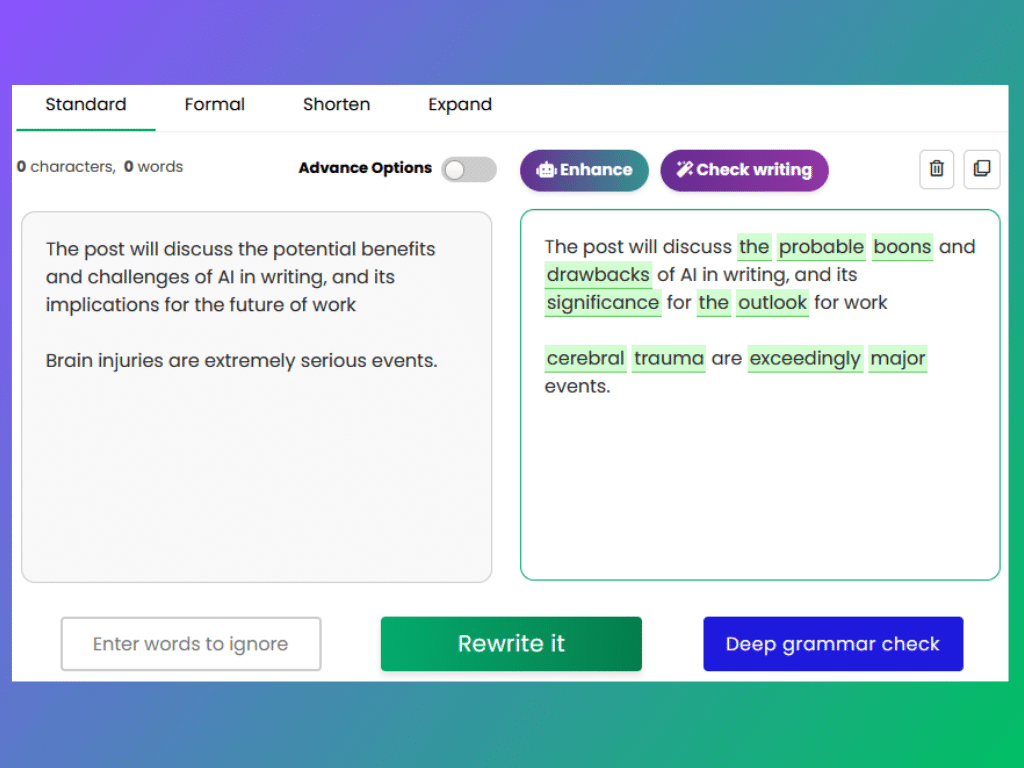
Meaning
Reword entails keeping the core essence of the same idea or concept while expressing it in a different way. Mainly as a technique in writing, it can be quite a handful when you need to avoid plagiarism and simplify difficult ideas or deliver information in a unique manner.
Definition
- To change the wording of
- Say the same thing in a different, creative way
Verb
The simple past: Reworded; I reworded the paragraph to make it more concise and easier to understand.
Present participle: Rewording; The author is currently rewording their writing to make it better.
third-person singular simple present: Rewords; The journalist rewords documents to improve readability.
Synonyms
- Rewrite
- Rephrase
- Restate
- Put differently
- put in other words
- Express differently
- Paraphrase
- Swap
Examples of Reword in a Sentence
- I decided to reword my essay to improve the clarity and flow of my argument
- The author asked the editor to reword a particular sentence in the manuscript to make it more concise and impactful.
- As a professional writer, it is essential to have the ability to reword sentences and paragraphs to adapt the content to different audiences or platforms.
How Do I Reword: Techniques and Strategies
Reword calls for careful consideration and thorough comprehension of the original content. Let’s learn some techniques and strategies that will surely help rephrase your text effectively:
1.) Know the Context: Take your full time to comprehend the context and intent of a text before attempting to alter it. By doing so, you can explain the original content in a new and fresh way while maintaining its originality.
2.) List the Main Ideas: Determine the main points and the ideas of the original text and use several patterns of phrase, and terminology in your updated version to strengthen these key points.
3.) Modify Sentence Structure: Modifying a sentence and changing its structure is another effective technique. You should try moving text around, switching from active to passive sentences, or vice versa. It would be very useful, as it may offer a fresh viewpoint on the original content.
4.) Try Using Different Synonyms & Vocabulary: You must try using different vocabulary and synonyms of the original ones. There are various tools on the internet, like thesauruses and online dictionaries, but be very cautious to use new words adequately, as it may change the meaning of your sentence completely.
5.) Simplify Difficult Languages: Consider simplifying the original text, especially if it was written in a complex language or in a slang way. In order to make your text more accessible to a wider audience, change the language or reword it without losing its main point.
Online Tools
Luckily, there are several online tools at your disposal that offer helpful suggestions and assist you with rewording. Here are a few websites that can help.
1. Rewritetool.net

The reword tool analyzes the source text and generates paraphrases based on different patterns and synonyms. Although they might be an excellent place to start, the result should always be thoroughly reviewed and proofread.
2. Thesauruses
Thesauruses serves as helpful tools for exploring synonyms and finding alternate terms that can improve your written content.
Although these tools can be a useful, it’s important to keep in mind that they are not a replacement for human judgment and originality. You should always review and proofread the content to ensure that the text exactly expresses the initial concept while offering a new angle.
Interesting read: Learn more about rephrase meaning and definition, you might be interested in discovering rephrase synonyms too.


